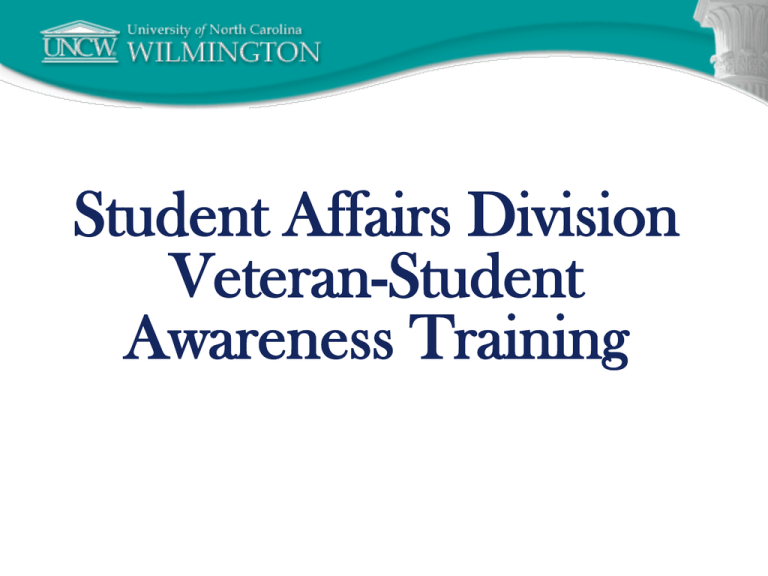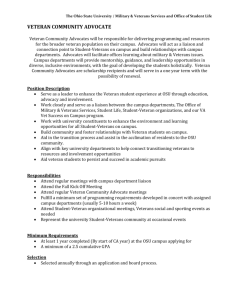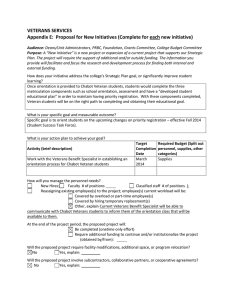Student Affairs Division Veteran-Student Awareness Training
advertisement

Student Affairs Division Veteran-Student Awareness Training WHO ARE THESE VETERAN STUDENTS? What Distinguishes this Student Group? • Over 2 million troops (15% female) have been deployed to OEF/OIF (1 out of 7) • Multiple deployments are common • As of 10/11/10, 5,725 have died and almost 42,497 wounded. 120 deaths of females and 600 wounded females. • Most frequent physical injuries include TBI, traumatic amputations and injuries that require amputation, burns and blindness • The psychological impact of war has also led to increased rates of suicide and other mental health concerns • High incidence of military sexual trauma • In war, there are no unwounded soldiers. -Jose Narosky • Veterans coming home from a conflict can expect to have a broad range of psychological reactions to what they have experienced while they were away. • It is likely that many will make the adjustment to returning home well and their initial difficulties will subside with time. However, for many others their experiences abroad will continue to haunt them. • “I learned early that war forms its own culture. The rush of battle is a potent and often lethal addiction, for war is a drug, one I ingested for many years… War exposes the capacity for evil that lurks not far below the surface within all of us. And that is why, for many, war is so hard to discuss once it is over.” -Chris Hedges, Veteran War Correspondent War is a Force That Gives Us Meaning • What has the government done to facilitate the veteran’s transition back to the civilian world? Preparing For Battle • Battlemind Training - prepares the soldier with the psychological tools he/she will need to survive in combat Battlemind BATTLEMIND is the Soldier’s inner strength to face fear and adversity in combat with courage. Key components include: • • • • • • Self-confidence Take calculated risks Handle challenges Mental Toughness Overcome obstacles or setbacks Maintain positive thoughts during times of adversity and challenge Transitioning Home Utilizing The Battlemind Concept • • • • • • • • • • Buddies (Cohesion) vs. Withdrawal Accountability vs. Controlling Targeted Aggression vs. Inappropriate Aggression Tactical Awareness vs. Hyper vigilance Lethally Armed vs. “Locked and Loaded” at Home Emotional Control vs. Anger/Detachment Mission Operational Security vs. Secretiveness Individual Responsibility vs. Guilt Non-defensive (Combat) Driving vs. Aggressive Driving Discipline and Ordering vs. Conflict Challenges for Student-Veterans • Half of Us: Video: Voices of Vets • Older students may have difficulty integrating into a campus composed primarily of traditionally-aged students • Military educational benefits do not provide enough resources to attend college full-time • Academic preparation for college may have been deficient • Poor readjustment to civilian life • Lack of structure in a university environment Student-Veterans vs. Traditional Students • Level of maturity • Exposed to different cultures • Responsibility/leadership experiences of a higher degree Engagement vs. Anonymity • Some student-veterans have desire to connect with other student veterans • Some student-veterans prefer to “blend in” primarily due to a perceived lack of sensitivity to their experiences and opinions • http://www.halfofus.com/video/?videoID =76&chapterID=1 • What can we, as individuals, do or not do to ease the transition of the Student Veteran back into the civilian world and into campus life? Welcoming Student-Veterans To Campus • Welcome them home • Express your appreciation of their service • Offer to help with their transition to (or back to) campus • Support with patience and listening • Understand that the transition home is a process and can take time Good Ways To Start A Conversation • What was your job and where did you go while in the military? • How are you and your family doing? • Ask open-ended, general questions about their military service • Listen non-judgmentally Topics To Avoid When Speaking With A Veteran • Pressuring a veteran regarding specifics about their service they choose not to share with you • Minimizing the challenges a veteran might face • Making assumptions about any veteran’s political or foreign policy views • Singling out a veteran without prior approval (let them choose who they tell about their distinction as a student veteran) Inappropriate Questions • • • • • • • Did you kill anyone? Did you see anyone die? Are you glad that you’re back? Do you have to go back? Did you see any action? Was it hot? Did you see any camels? Do you think we are winning over there? Is it all worth it? Opportunities for Engagement A comprehensive and holistic system for assisting veterans • • • • • • • Identification of each Student –veteran Orientation for incoming Veterans and dependents Mentorship or Transition coach Academic advising Education for staff and faculty Procedures for making referrals Needs assessments and outcome studies What Has UNCW Done To Make Our Campus Attractive To Veterans?

